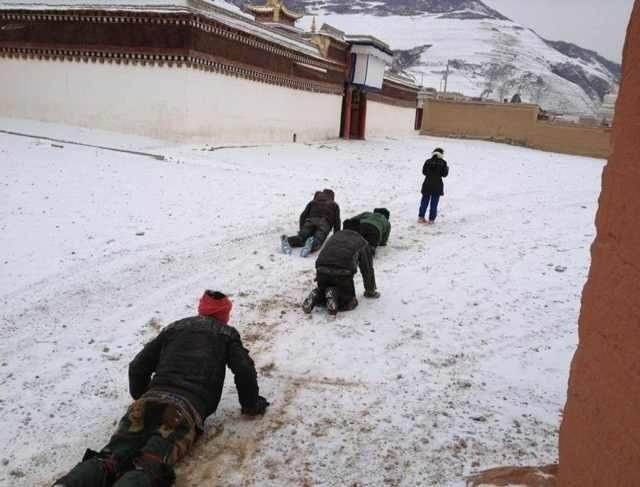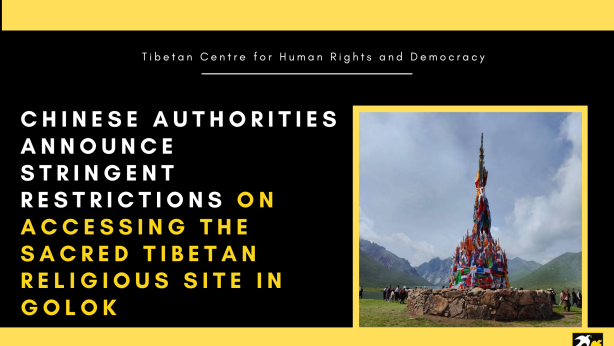Tibetans ordered to celebrate festival or face punishment
As Tibetans in Tibet mourn the loss of lives in self-immolation protests by observing a quiet Losar (Tibetan New Year), the Chinese authorities are ordering Tibetans to celebrate the festival by announcing huge rewards, and punishments for those who disobey the order.
According to information received by TCHRD, days prior to Losar, which began 11 February, Chinese officials in Tsolho (Ch: Hainan) Prefecture, Qinghai Province, were seen visiting Tibetan villages in the area, ordering the Tibetans to celebrate the New Year.
Officials announced that villagers would be rewarded handsomely if they celebrate the New Year. They warned that those Tibetans who did not celebrate would be deprived of financial help for farming and animal husbandry.
Visiting Tibetan families and houses, Chinese officials told the Tibetans that they should have a grand Losar celebration. Heavy fines would be imposed if Tibetans refused to celebrate. Tibetans have been ordered to engage in traditional games like horse riding, dice and shooting arrows.
Those who advocate the boycott of Losar would be seriously dealt with in accordance the law, sources told TCHRD quoting the Chinese government officials.
Meanwhile, Tibetans in Bora Township in Sangchu (Ch: Xiahe) County have pledged to dedicate the New Year, as a gesture of solidarity to Tibetans who have self-immolated for Tibet’s freedom.

They did not buying new clothes, lavish food and drinks and are instead did prostrations and offered prayers at the Bora Monastery, the site of a considerable number of self-immolation protests in the Bora area. [See image]
In Rebkong (Ch: Tongren) County, Tibetans didn’t have any grand Losar celebrations. They were simply paying respect to the portrait of His Holiness the Dalai Lama and visiting the monasteries.
According to sources in Rebkong, Tibetans said they decided not to celebrate Losar in grand festivities. The Tibetans didn’t visit families or friends to express their New Year wishes; nor did they indulge in games like dice and excessive drinking. They remained indoors.
In Rebkong, officials erected huge gates decorated with dragons, the Chinese national symbol, in front of the offices, main roads and intersections, in an attempt to show to the world that Tibetans are celebrating the New Year in grand styles.
However, Tibetans resisted the Chinese propaganda, as they by refused to buy firecrackers and other stuffs meant for Losar celebrations. Tibetan shops refused to sell firecrackers.
Most of the local Tibetans engaged in acts of solidarity, as they visited monasteries to pray for the souls of fellow Tibetans who died for the Tibetan cause.
Moreover, just before the onset of Tibetan New Year, under the pretext of keeping thieves and pick pockets at bay, Chinese security forces were especially stationed in Rebkong area.
In the Tibetan capital Lhasa, in an attempt to showcase to the world that Tibetans are celebrating the New Year, Chinese officials ordered them to paint the walls of the Gutoe Ramoche Monastery.
On the morning of 5 February, the Chinese Communist Party leaders, Gonpo Tashi and Lobsang Tenzin, accompanied by the officials of the monastery’s Management Committee, visited Ramoche Temple, asking the monks to celebrate this year’s Tibetan New Year. They ordered the monks to whitewash the walls of the monastery, put on new window and door covers and hoist flags of different colours. They also warned that monks who refuse to celebrate the New Year would be regarded as committing serious political offences.
Since 2008, when major protests broke out throughout Tibet, in which many Tibetans died at the hands of Chinese security forces, monks from Gyutoe Monastery had decided not to celebrate the Losar. As a result, the monastery was especially targeted this year by the Chinese government.


